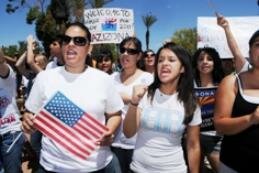Building trust: Restoring civil rights after the “War On Terror”
Immigration, Politics, Racial Equity, US — By Erik Love on March 16, 2010 at 08:00Looking forward to 9/11/11 requires a renewed focus on restoring the civil rights of American Arab, Muslim, Middle Eastern, and South Asian communities. Simply put, this means an end to most of what used to be called the “War on Terror.” The institutions responsible for most of the action in the “War On Terror” are the Department of Justice (DoJ) and the Department of Homeland Security (DHS).
Even more than intelligence gathering and investigative work, these agencies’ efforts at “community outreach” have been crucial to American counterterrorism efforts, as explained in the proud statements from top officials at the DoJ and DHS. ”Building trust” between these agencies and advocates for civil rights has been a top priority since 2001. Expressing concern for civil rights has been a key part of these outreach efforts. Recently, however, amid reports about agents provocateur infiltrating mosques and community organizations, some advocates have expressed doubt that any concern from DoJ and DHS for civil rights is little more than a false projection.
In the immediate aftermath of the 9/11 attacks, proactive outreach from the DoJ’s Civil Rights Division arose from a keen recognition of “backlash” affecting a racialized collection of ethnic groups: Arabs, Muslims, Middle Easterners, and South Asian Americans. Even as they recognized the role of racism, DoJ officials soon nicknamed the diverse collection of ethnic groups with a decidedly race-neutral shorthand: “The Post-9/11 Community.” As reports of hate crimes flooded in to FBI offices around the country, leading advocacy groups representing these communities were contacted by a task force in the DoJ’s Civil Rights Division.
Along with other federal enforcement agencies (like the Equal Employment Opportunity Commission), DoJ and DHS made it easy to report suspected hate crimes or employment discrimination. Working together, advocates from community organizations met with FBI agents, DoJ lawyers, and other government officials tasked with fighting hate crimes, stopping workplace discrimination, and generally ensuring that civil rights laws are enforced. This joint antiracism work between the government and civil rights advocates continues into the present day.
In the past year, however, the relationship between advocates and the state has come under increasing strain. Tension has mounted as the most egregiously discriminatory policy – “Special Registration” — remains in place despite tireless efforts by civil rights advocates to dismantle it. The impact on families due to Special Registration is hard to overstate — prolonged detentions in immigration prison have resulted in all kinds of problems for perfectly innocent people, often detained simply because they are from predominantly Muslim nations.
Tension between civil rights organizations and the federal government peaked last year. Advocates expressed dismay at the revelation of possibly illegal spying on community organizations undertaken by the FBI. Since 2009, the Council on American Islamic Relations (CAIR) has documented at least 26 separate cases of discriminatory actions taken by the government toward Muslims in the US. One of the most serious issues noted by CAIR and other advocates was the use of agents provocateur, undercover FBI agents that intentionally suggest the use of violence in an attempt to entrap people. After the use of undercover agents was confirmed, several advocacy groups considered suspending their joint work with the FBI.
The status quo here is clearly unsustainable. There is a clear need for change in the programs formerly known as the “War on Terror.” The most obvious and helpful change would be an end to Special Registration. Beyond that, giving the civil rights divisions of DOJ and DHS more enforcement power and the ability to preempt new discriminatory efforts, like FBI spying, is crucial. Anything less will make attempts by the government at “community outreach” seem cynical at best.
Tags: 9/11, arab americans, civil rights, Council on American Islamic Relations, counterterrorism, Department of Homeland Security, Department of Justice, Politics, south asian, War On TerrorAuthor: Erik Love (4 Articles)
Erik Love is a Ph.D. candidate at University of California, Santa Barbara. [email protected]



 Share This
Share This Tweet This
Tweet This Digg This
Digg This Save to delicious
Save to delicious Stumble it
Stumble it





 Judge weakens SB 1070, puts on hold law's punching effects aimed at immigrants in Arizona
Judge weakens SB 1070, puts on hold law's punching effects aimed at immigrants in Arizona Texas Education Board's ideological bullying: A reflection
Texas Education Board's ideological bullying: A reflection Racial discrimination should not trump voting rights
Racial discrimination should not trump voting rights








1 Comment